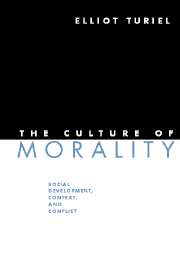Book contents
- Frontmatter
- Contents
- Preface
- 1 Introduction
- 2 Striving for Community
- 3 Discontents Revisited
- 4 Social Judgments and Social Contexts
- 5 The Development of Moral and Social Judgments
- 6 Social Thought and Social Action
- 7 Social Harmony and Social Conflict
- 8 Justice, Heterogeneity, and Cultural Practices
- 9 Social Hierarchy, Subordination, and Human Capabilities
- 10 Perspectives on Cultural Practices: More Than One
- 11 Subversion in Everyday Life
- 12 Conclusion
- References
- Index
8 - Justice, Heterogeneity, and Cultural Practices
Published online by Cambridge University Press: 05 June 2012
- Frontmatter
- Contents
- Preface
- 1 Introduction
- 2 Striving for Community
- 3 Discontents Revisited
- 4 Social Judgments and Social Contexts
- 5 The Development of Moral and Social Judgments
- 6 Social Thought and Social Action
- 7 Social Harmony and Social Conflict
- 8 Justice, Heterogeneity, and Cultural Practices
- 9 Social Hierarchy, Subordination, and Human Capabilities
- 10 Perspectives on Cultural Practices: More Than One
- 11 Subversion in Everyday Life
- 12 Conclusion
- References
- Index
Summary
The recognition of diversity within different cultures is extremely important in the contemporary world, since we are constantly bombarded by oversimple generalizations about “Western civilization,” “Asian values,” “African cultures,” and so on.
—Amartya Sen, Human Rights and Asian Values, 1997On March 6, 1999, the New York Times ran an article with the title “Testing the Limits of Tolerance as Cultures Mix: Does Freedom Mean Accepting Rituals that Repel the West?” The writer, Barbara Crosette, began by relating two events. One occurred in the state of Maine, where it seems a refugee from Afghanistan was seen kissing the penis of his baby boy – which is a traditional expression of love by a father. The police became involved and the baby was taken away from his father by Social Services, who was accused of child abuse. The second event pertained to female circumcision. Crosette reported that a hospital in Seattle had tried to invent a procedure for female circumcision that would be harmless and yet satisfy parents from Somali who wanted to maintain the practice in their community. According to Crosette, the idea went nowhere because of criticism from an outraged public. A third type of event was presented through photographs, accompanying the article, of a young boy and girl in local dress, each of them 7 years old, from Madhya Pradesh State in India. The caption read that “in their villages marriage is arranged early.”
- Type
- Chapter
- Information
- The Culture of MoralitySocial Development, Context, and Conflict, pp. 181 - 198Publisher: Cambridge University PressPrint publication year: 2002



